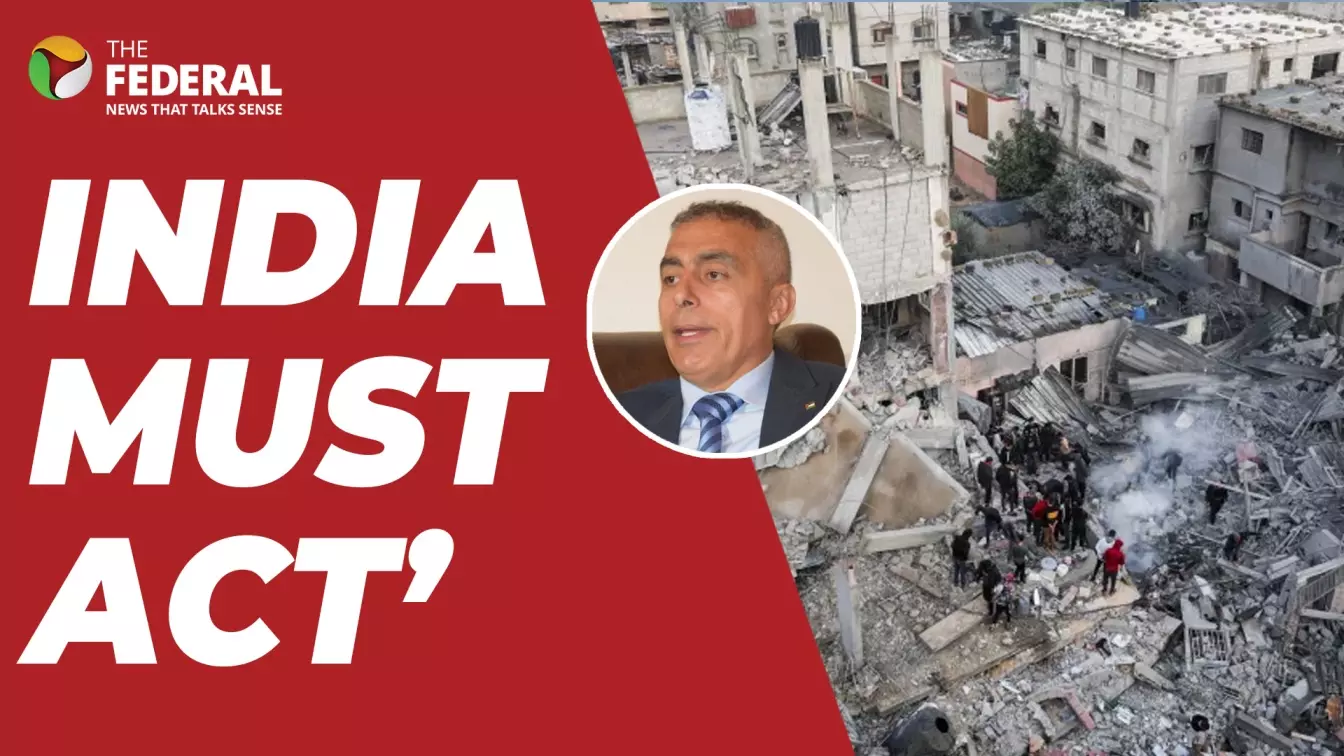
Abdullah M Abu Shawesh, Palestinian envoy to India
Is India doing enough? Palestinian envoy opens up on Gaza war
Shawesh reflects on India’s diplomatic stance, the crisis in Gaza, and the shifting global alliances shaping Palestine’s future

As Gaza reels under what he calls a “textbook genocide”, Palestinian Ambassador to India Abdullah Mohammad A. Abu Shawesh says the region faces not just destruction, but a systematic erasure. In an exclusive interview with The Federal, the ambassador reflects on India’s diplomatic stance, the crisis in Gaza, and the shifting global alliances shaping Palestine’s future. He also opens up about the deep personal toll of representing his people while his own family is under siege in Gaza.
India's diplomatic stance
India has long supported the Palestinian cause, especially at multilateral platforms like the UN General Assembly. Ambassador Shawesh acknowledges this support, saying, “India stands firm to the principle of supporting the Palestinian people and voting in favor of their resolutions.” However, he also notes the complexity introduced by India’s deepening ties with Israel.
Despite this diplomatic balancing act, the envoy expresses hope. “India is supporting the Palestinian people in the international and multilateral arena,” he reiterates, calling India a friend whose voice still matters globally.
Global South solidarity
When asked about emerging support for Palestine from countries like South Africa, Brazil, and India, Shawesh is unequivocal. “All of these countries are already supporting the Palestinian cause,” he says, citing South Africa’s legal challenge against Israel at the International Criminal Court (ICC) as an example of proactive diplomacy.
Also Read: World leaders shouldn’t fail Gaza’s children; no kites can fly in a battlefield
The ambassador places considerable hope in the Global South, suggesting that as Western powers turn indifferent, nations from the South could become the new champions of Palestinian rights.
Gaza’s unfolding horror
Describing the situation in Gaza as a “humanitarian catastrophe,” Shawesh doesn’t mince words. “It’s an American-Israeli textbook genocide against the Palestinian people,” he says. The numbers are grim — over 51,000 Palestinians killed, most of them women and children. Thousands have lost limbs, and an estimated 12,000 remain unaccounted for, many likely buried under rubble.
“Gaza was to some extent completely levelled to the ground,” he says. With infrastructure destroyed and 90% of Palestinians displaced, the region faces a future of uncertainty. Education has halted for three consecutive years, with universities and schools reduced to ruins.
Oslo Accords and negotiation
Even amid such devastation, Shawesh says Palestine remains open to peace. “Our hand is already there,” he insists. “We are ready to sit at the negotiation table.” The obstacle, he says, is Israel’s current leadership.
He blames Israeli Prime Minister Benjamin Netanyahu for dismantling the Oslo Accords, accusing him of opposing the two-state solution and undermining efforts made by former Israeli leaders like Yitzhak Rabin. “The only one who is standing against the Oslo Accords is the current prime minister,” Shawesh asserts.
A personal burden
For Shawesh, the diplomatic role is deeply personal. “My entire family, my whole entire relatives are there living in Gaza,” he reveals. “I lost many of them.” Despite the pain, he sees his work as a duty. “Everyone with his own tools,” he says. “My tools here are diplomatic, and I will continue to support and raise my people’s voice.”
His remarks highlight the emotional toll faced by Palestinian diplomats who must remain composed while their loved ones are in peril.
Abraham Accords and Arab unity
Asked about the impact of the Abraham Accords — which saw some Arab nations normalize ties with Israel — Shawesh denies any weakening of the Arab world’s commitment to Palestine. “Not at all,” he says. “This proves that the Arabs themselves are ready for peace.”
According to him, it’s Israel that has failed to meet the region’s overtures. “Unfortunately, the other side, which is the Israeli occupation, is not ready for peace,” he concludes.
The content above has been generated using a fine-tuned AI model. To ensure accuracy, quality, and editorial integrity, we employ a Human-In-The-Loop (HITL) process. While AI assists in creating the initial draft, our experienced editorial team carefully reviews, edits, and refines the content before publication. At The Federal, we combine the efficiency of AI with the expertise of human editors to deliver reliable and insightful journalism.

